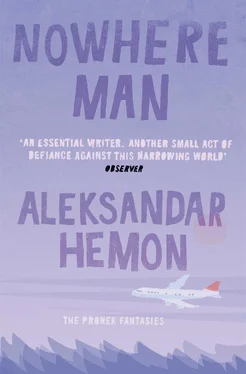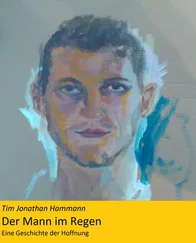But let us turn off the time machine and not rush toward the inescapable future. Let us wipe the misty windshield of memory and look at him standing dazed in front of the beehive-like building of Prva gimnazija. In one of those tedious, serious conversations about his life, forced upon him by his mother and father, Pronek had professed his desire to be a music teacher, a toy idea thrown to his worried parents while he was attending to his real plans, which mainly consisted of not being separated from Mirza. Future music teachers (and Mirza) were going to Prva gimnazija , which claimed to have a cultural slant, and this aura of culture attracted sophisticated, urban girls, all wearing skimpy skirts and demeanors of experienced boredom. In no time at all did his guitar playing and his repertoire of Beatles songs come in handy — the cultural girls all spoke English and had crushes on foreign rock stars. Soon the Pronek-Mirza tandem was a staple at every party — the girls to boys ratio happily five to one — where they played “Yesterday” and “Hey, You’ve Got to Hide Your Love Away” and “Michelle” to an audience of teary-eyed, soft-skinned schoolmates. They expanded their repertoire to include domestic songs (Sevdalinke and corny hits from the elementary days), appropriate for the later hours of more thorough inebriation, songs that could be played only by gently strumming the strings, as someone’s warm temple was pressing against the tired arm. At even later hours, they covered for each other — one of them would be steadily producing the romantic, candlelight atmosphere, while the other poured sweet poison into a beautiful ear, murmuring that tonight, “Yesterday” was just for her.
They could not have cared less about the cultural body of knowledge they were supposed to absorb. Mirza and Pronek were expelled from a literature class in which the teacher — a young, enthused man, who surely had stacks of poetry hidden away under his bed — tried to make them see that life was a fish in The Old Man and the Sea. They were thrown out of the philosophy class because they started sniggering, after the teacher told them about the philosopher who had a stunning revelation and exclaimed: “What is is!” They learned more songs for the late party hours, going deeper into the feeling that Bosnians call sevdah —a feeling of pleasant soul pain, when you are at peace with your woeful life, which allows you to enjoy this very moment with abandon.
And there were moments. Sarajevo in the eighties was a beautiful place to be young — I know because I was young then. I remember linden trees blooming as if they were never to bloom again, producing a smell I can feel in my nostrils now. The boys were handsome, the girls beautiful, the sports teams successful, the bands good, the streets felt as soft as a Persian carpet, and the Winter Olympics made everyone feel that we were at the center of the world. I remember the smell of apartment-building basements where I was making out with my date, the eye of the light switch glaring at us from the darkness. Then the light would go on — a neighbor coming down the stairs — and we would pull apart. I also remember that a thug nicknamed Nikson sold me a brick and smacked me around in front of my girlfriend. I remember that my apartment was broken into and that there were two footprints on my parents’ bed. I remember the hateful moments in crowded, smoky bars, when I could not stand to look again at the faces I had known since birth. I remember the guy in the hospital bed next to mine whose thighs and ass were all cut up after a toilet bowl fell apart under him. But I choose not to think of those as important, my memories irrevocably coated in linden syrup.
Let’s go back to my friends.
Pronek and Mirza went to Jahorina mountain for winter break, and spent weeks skiing and hanging out, shacking up in a friend’s family cabin or someone’s hotel room, all because of their entertaining skills. Here is the winter pleasure inventory: blue skies, white snow, suntanned faces, crisp air, speed, slopes, fireplaces, warm rooms, and hearing the scrunching of footsteps on a cold night, the moon like a silver coin. It was in a Jahorina cabin, after a particularly inspired performance of a Beatles set, into which “If You Know Her Name” was stealthily included, topped with a sevdah set, plus — when the party climax was reached — a few pseudo-Gypsy songs, producing a few yelps of pseudo-abandon. . it was (let me start all over again) in a Jahorina cabin that Pronek climbed to an upstairs room with one Aida. She was willing to let him explore “the jungle below the equator.” Pronek, however, got completely lost in the jungle: he kept banging his knees against the sides of the bed, and his head against the wall. He had great difficulty pulling off Aida’s tight jeans, managing to bring them down to her ankles, whereupon he crawled in between her legs. With his underwear stranded at the Antarctica of his feet (the room was unheated, save for their cumbersome passion) he attempted to penetrate her panties, convinced that he was up against a sturdy hymen. It was an unmitigated fiasco — she started laughing uncontrollably, when Pronek, in the middle of it all, said: “Let me just love you.”
It took them longer to disentangle than it took them to entangle. That night, Pronek confided in Mirza, who was expecting stories akin to the readers’ letters in his parents’ magazine. Pronek told him that he could never understand how making love could be pleasurable. He offered (rhetorically speaking) as evidence the bumps on his head, scratches on his knees, and bruises on his penis.
A few days later, Pronek went with Aida for a mountain walk under a starry sky. They held hands, despite the thick wool mittens, and ended up in her room, where Pronek played a few songs — purely pro forma — while Aida mindfully wore a skirt, which kept sliding up her thighs. In a four-minute flurry of passion, Pronek was deflowered, at the blessed age of fifteen and a half, while Aida was flowered, so to speak, with his gratitude: he mindfully asked her if she had enjoyed it, and she, her kind soul glimmering in her green eyes, she said she did.
It is hard to say whether Pronek and Mirza’s decision to start a band, again, was related to Pronek’s entrée into sexual adulthood, but it followed soon thereafter.
They needed electric guitars — their long-untunable acoustic guitars reminded them unpleasantly of their innocent preadolescent days. They spent the summer of 1983 moving around sacks of cement for measly money, mainly in order to convince their parents they were serious about getting the guitars. Too tired to play or think, they drank beer after work, still gray with cement dust, well aware they were collecting legitimate life experience — toiling for a dream, even if only for a few weeks — that was not unlike a real rock-star life experience. The Beatles, after all, worked on the Liverpool docks, they would excitedly (and wrongly) recall. They imagined a future in which they played on huge stages, a firmament of stage lights above them, and the drummer twirling his sticks. They traveled around the world — London, Amsterdam, Chicago — on a bus with a fridge. They had millions of dollars: Pronek bought a house in Liverpool, where the Beatles (minus John) lived, and Mirza owned a horse farm and a riding range.
By the fall of 1983, they had electric guitars (Harmonia, the cheap East German make). They started producing songs, drinking pitchers of raspberry concentrate diluted in water, as if it were the wine of divine inspiration. Pronek wrote the lyrics, in English (the bus with a fridge beckoning him), that would have, he hoped, universal appeal, while conveying love for the one that was meant for him (but the one that didn’t exist — he did not call Aida, and avoided her on the street). The one was present in the songs metonymically mainly through her eyes, though sometimes her face would appear as well. Although those lyrics have been lost (in fact, they were probably burned by his parents in a little cast-iron stove during the siege), we still have the titles: “Her Eyes Are Like Stars”; “I Could Drown in Her Eyes”; “Her Face”; “Her Eyes Are Watching You”; “Did You See Her Eyes?” The paradigm for his songs was provided by “Yesterday,” and they resembled one another so much that Pronek often hallucinated he had a style. Yet, he was frequently tormented by the doubt that invades the heart of many an artist: that his art, excavated from the deepest recesses of his soul, was just plain shit. On some days, he would be so ashamed that he would cancel the practice. He could not bear thinking of his own songs — his talentlessness stretched before him like the Sahara before a tired traveler on a stinky camel. On other days, practicing stage moves in front of the mirror, he would admire his craftsmanship, even detecting the ineffable presence of his true self in some of his songs, particularly “Her Eyes Are Watching You.”
Читать дальше












